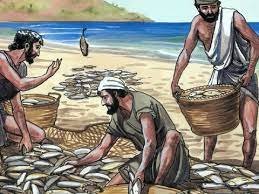It is often referred as the Parable of the Talents (Matt 25: 14 – 30) or Parable of the Ten Pounds (Luke 19: 11 – 27). In the time of Jesus, the talent was not a coin, it was a weight; and therefore, its value obviously depended on whether the coinage involved was copper, gold or silver. The commonest metal involved was silver; and the value of a talent of silver was about 20 years’ salary (referring to those times).
Who does this parable speak about
There can be no doubt that originally in this parable the whole attention is focused on the useless servant. It seems to me that the servant represents the Scribes and the Pharisees, and for their attitude to the Law and the truth of God. The useless servant buried his talent in the ground, in order that he might hand it back to his master exactly as it was. The whole aim of the Scribes and Pharisees was to keep the Law exactly as it was. Any change, any development, any alteration, anything new was to them anathema. In other words, their method can be called as paralysis of religious truth. Like the man with the talent, they desired to keep things exactly as they were–and it is for that that they are condemned.
Looking at the parable from the King’s perspective.
(i) It tells of the king’s trust. He gave his servants the money and then went away and left them to use it as they could and, in a way, thought fit. Because he was away, he did not interfere with them, or stand over them directing them. He left them entirely on their own to handle matters as they deem fit. Is it not the way in which God trusts each one of us.
(ii) It tells of the king’s test. God’s trust is a test, of whether or not I’m faithful and reliable in the little things entrusted to me. I may have my own justification stating that God “He has a mind above small matters or trifle things”, unfortunately God does not. I have realised that God is testing me in the small matters as well as big matter. Let’s look at Jesus’ example of his thirty-three years of life spent on earth, Jesus spent thirty in Nazareth. Had he not discharged with absolute fidelity the routine and mundane tasks at the carpenter’s shop in Nazareth, God could never have given him the supreme task of being the Saviour of the world.
(iii) It tells us that King gives men differing gifts. One man received five talents, another two, and another one. It is not a man’s talent, which matters; but how he uses it. God never demands from a man ability which he has not got; but he does demand that a man should use to the full the abilities which he does possess. Men are not equal in talent; but men can be equal in effort. The parable tells us that whatever talent we have, little or great, we must lay it at the service of God.
Looking at it from the Servant’s perspective.
(i) It tells us that the reward of work well done is still more work to do. The two servants who had done well are not told to lean back and rest because they have done well. They are given greater tasks and greater responsibilities in the work of the master.
(ii) It tells us that the man who is punished is the man who will not try. The man with the one talent did not lose his talent; he simply did nothing with it. Even if he had ventured into some trade with it and lost it, it would have been better than doing nothing at all. Many a times I too think, “I have so small a talent and I can do so little with it. It is not worthwhile to try, for all the contribution I can make.” Then I remember that condemnation is for the man who, having even one talent, will not try to use it, and will not risk it for the common good of others.
(iii) It lays down a rule of life which is true. It tells us that to him who has, more will be given, and he who has not, will lose even what he has. The meaning is this. If a man has a talent and exercises it, he is progressively able to do more with it. But, if he has a talent and fails to exercise it, he will inevitably lose it. Looking at it from a proficiency of playing tennis or a musical talent, if I continue doing something and the more, I exercise that proficiency and that gift, the better I become at it. Whereas, if I fail to use it, I lose it. That is equally true of playing golf or playing the piano, or singing or thinking out ideas. The lesson of life to be learnt here is that the only way to keep a gift is to use it in the service of God and in the service of our brethren.
Let’s look at the excuse of the servant,
(i) I knew you, that you are a hard man. In other words, his defence is his offence. It was like that of wicked saying of the house of Israel, the way of the Lord is not fair Ezek 18:25. Oh the foolishness of man perverts his way, and then, for solace lays the blame on the Lord. An example that comes to mind of Adam, who implicitly laid the fault on God himself; The woman who You gave me. A point of note, our carnal hearts are apt to conceive false and wicked opinions concerning God, and then it hardens itself in its evil ways.
(ii). The spirit of a slave; I was afraid. Any ill affection toward God arose from his false notions; and nothing is more unworthy of God, thus hindering our duty to Him, than slavish fear. In other words, this is bondage and torment, and is directly opposite to that entire love which the great commandment requires. To put it simply hard thoughts of God drive us from Him and cramps us in His service.
Lets now look as his conviction, he is convicted of.
(i) Slothfulness; You wicked and lazy servant. A lazy servant is a wicked servant, and will be reckoned with as such by their master, for he that is lazy in his work, and neglects the good that God has commanded. One could count him as a brother to him that is a vandal, by doing the evil that God has forbidden Prov 18:9.
(ii) Self-contradiction: You knew that I reaped where did not I sow: then you ought to have invested put my money with the bankers. Note, The hard thoughts which sinners have of God, though false and unjust, will be so far from justifying their wickedness and slothfulness, that they will only aggravate and add to their guilt.
There is no such thing as standing still in the Christian life. We either get more or lose what we have. We either advance to greater heights or slip back.
On a personal reflection, I need to take stock of the talents given by God to me and reflect as to which servant I represent.
Do I see God as a God of Love or a God of Judgement. Do I serve God for the love He has shown me or because of fear of condemnation?



